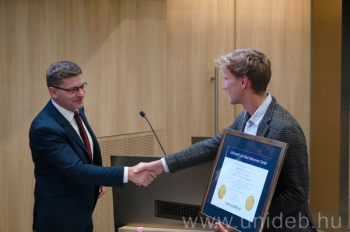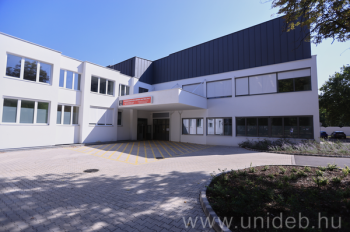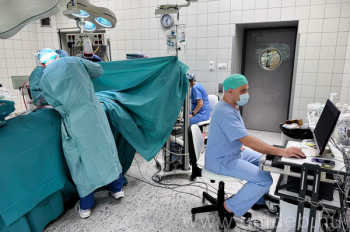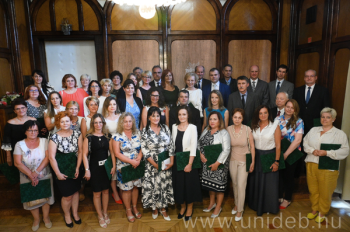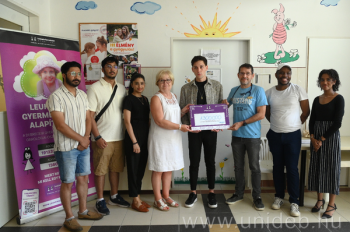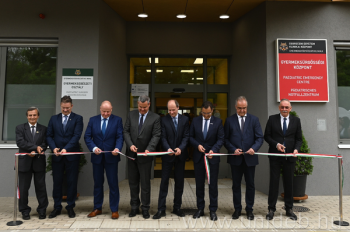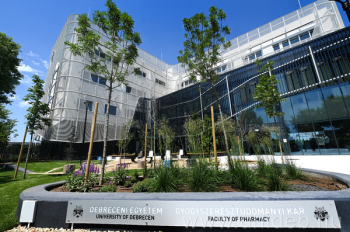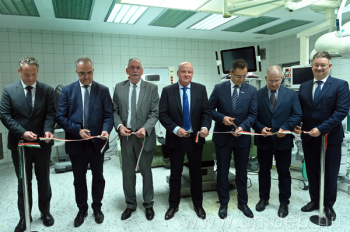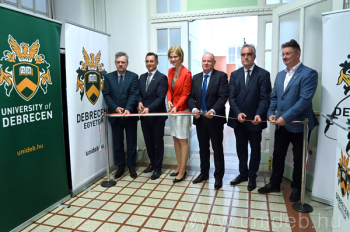The Divison of Operative Techniques and Surgical research and Interactive Medical Practice Centre of the Faculty of General Medicine of the University of Debrecen have been awarded a certificate of excellence. The outstanding work of the institution has been recognised by one of the world's leading simulator development companies. The certificate was presented at a conference on simulation education in Debrecen on Tuesday at the Learning Center.
Hírek Clinical Centre címkével
From the third of September, the paediatric surgical in-patient unit will be operating in the recently opened Children’s Surgery Centre of the University of Debrecen. The new building provides state-of-the-art treatment for children. The centre has 2-3 bedded wards with bathrooms, two operating theatres, examination and service rooms.
A new neuromonitoring system with pedicle screw stimulation has been introduced at the Department of Neurosurgery of the University of Debrecen Clinical Centre. Using the procedure, the surgeon receives feedback on the position of the inserted screws during the spinal surgery, which can be corrected immediately if necessary. The new method makes it safer than ever to perform procedures to treat spinal deformities.
More than forty staff members of the University of Debrecen Clinical Centre were honoured for their outstanding and exemplary work at the Semmelweis Day ceremony. At Friday's event, Zoltán Szabó, President of the Clinical Centre, presented the Presidential Diplomas of Recognition, the Clinical Chief Physician Awards, the Clinical Centre Patient Care Medal, and the Outstanding Physician Medal and Award in the renovated boardroom of the President's Office.
The boardroom of the President's Office of the University of Debrecen Clinical Centre has been restored. In 1918, Charles IV and his wife Queen Zita inaugurated the Royal Hungarian University of Debrecen in the building. During the project, the building was given an appearance worthy of its historical significance.
The International Student Union (ISU), an organization of foreign students of the University of Debrecen, donated more than one million HUF from the proceeds of this year's Food Day to the Foundation for Children with Leukemia. The money will be used to build a special sterile room in the paediatric haematology-oncology department.
The Clinical Center of the University of Debrecen can provide the highest level of emergency and accident care for children in its new Pediatric Emergency Center. The building, equipped with the most modern devices and instruments, was constructed out of more than three and a half billion HUF. The new center was officially inaugurated on Monday.
The new building of National Manufacturing, Research and Education Center of the Faculty of Pharmacy, recently inaugurated in Vezér Street Industrial Park of the University of Debrecen, is now available for both education and pharmaceutical research and manufacturing. The three-floor, almost 7,000 square-meter, complex was built in one year at the cost of roughly HUF 12 billion.
The Da Vinci robot-assisted surgical system has arrived at the University of Debrecen Clinical Centre. The 21st-century, state-of-the-art technology is used primarily in general surgery, as well as surgical procedures in urology, gynaecology and otolaryngology. Thanks to the precise and safe surgical techniques made possible by it, the risk of complications is reduced and recovery times are shortened. The investment of more than one billion Hungarian forints in robotic surgery was officially introduced at the institution on Tuesday.
The Cornea Outpatient Clinic, which was inaugurated on Thursday at the Ophthalmology Department of the University of Debrecen Clinical Centre, uses state-of-the-art equipment to support the early detection of corneal diseases and provide better conditions for corneal surgery. The complexity of the equipment found in the clinic consisting of two surgeries and a treatment room is unique in the country. In addition to the outpatient clinic, the Cornea Bank, which has been operating for 30 years, also contributes to the excellence of the Ophthalmology Department.
